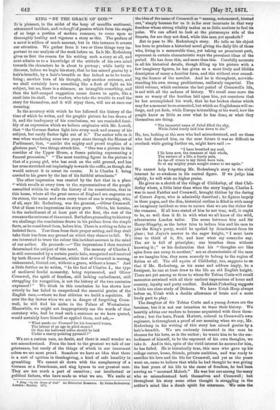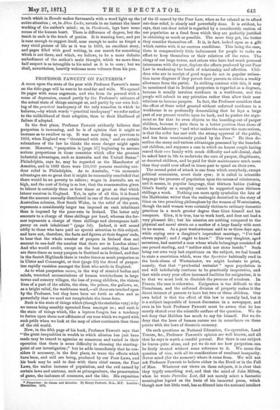KING "BY THE GRACE OF GOD."*
IT is pleasant, in the midst of the heap of maudlin sentiment, attenuated incident, and rechauffeof passion which form the staple of so large a portion of modern romance, to come upon so thoroughly healthy and vigorous a story as this. The preface of
a novel is seldom of much account, but in this instance it arrests our attention. We gather from it two or three things very im- portant to our analysis of the work before us. In it Mr. Rodenberg gives us first the reason for his writing such a story at all, and next admits us to a knowledge of the attitude of his own mind towards the characters he is about to portray ; while lastly we discover, before we begin his story, that he has missed genius by a hair's-breadth, by a hair's-breadth so fine indeed as to be tanta- lizing; another turn of his thought, only another sentence, and we shall certainly have something like a flash of light on his subject, but no, there is a shimmer, an intangible something, and then the half-escaped suggestion seems drawn in again, like a snail into its shell. Our readers, who take the trouble to read the story for themselves, and it will repay them, will see at once our meaning.
In the accuracy with which he has followed the history of the time of which he writes, and the graphic picture he has drawn of it, and the inadequacy of his conclusions, we are reminded forci- bly of an expression which we believe originates with Mr. Lowell, that "the German flashes light into every nook and cranny of his subject, but rarely flashes light out of it." The author tells us it was when wandering some two years since through the Houses of Parliament, that, "amidst the mighty and proud trophies of a glorious past," two things struck him. "One was a picture in the corridor of the Upper House, a fresco painting representing a funeral procession." "The most touching figure in the picture is that of a young girl, who has sunk on the cold ground, and has her arms stretched out imploringly towards the coffin, as though she would entreat it to arrest its course. It is Charles I. being carried to his grave by the last of his faithful attendants."
The other impression was created by the fact that in a place 1' which recalls at every turn to the representatives of the people assembled within its walls the history of its constitution, that in this house, where all the great names of England are eng,raven on
its stones, the name and even every trace of one is wanting, who, of all, says Mr. Rodenberg, was the greatest,—Oliver Cromwell.
Out of these two impressions his story grew. Olivia, his heroine, is the embodiment of at least part of the first, the rest of the romance the outcome of the second. But before proceeding to his story we challenge the conclusions drawn in his preface from the simple facts, as he considered them, before him. There is nothing so false as isolated facts. Tear them from their proper setting, and they shall take their hue from any ground on which they chance to fall. We are interested to trace the colour this incident assumes in the mind of our author. He proceeds :—" The impressions 1 then received determined the subject of this novel. The memory of Charles I. is still surrounded by a certain poetic halo, recognized and received by both Houses of Parliament, whilst that of Cromwell is unsung, unhonoured, blotted out, without a grave, without a home." And a little further on he writes, "In the fact of Charles I., the type of mediaeval feudal monarchy, being represented, and Oliver Cromwell, the spirit of freedom, still lacking embodiment, still struggling for recognition, is not the history of the two centuries expressed?" We think in this conclusion he has shown how utterly he has failed to comprehend the essential genius of the English race,—where we fear oblivion we build a sepulchre. If ever the day dawns when we are in danger of forgetting Crom- well, he will find his niche in the Palace of Westminster. Meanwhile, we might not inappropriately use the words of that secretary who, had he read such a sentence as we have quoted, would certainly have himself so applied them, and ask,—
" What needs our Cromwell for his honotirdd bones,
The labour of an age in piled stones ?
Or that his hallowed relies should be laid Under a starry-pointing pyramid ?"
We are a curious race, no doubt, and there is small wonder we are misunderstood. From the least to the greatest we talk of our grievances, but rarely of the things of which in our innermost selves we are most proud. Somehow we have an idea that there is a sort of egotism in thanksgiving, a kind of safe humility in grumbling. We cannot sit down with the complacency of a German or a Frenchman, and sing hymns to our greatest men.
They are too much a part of ourselves ; our intellectual or political fathers, who have made us what we are. We smile at
• Zing "by the Grate of God." An Historical Romance. By Julius Rodenberg. London: Bentley. 181L
the idea of the name of Cromwell as "unsung, unhonoured, blotted out," simply because for us it is for ever incarnate in that very freedom whose strong vitality makes us so little anxious to feel its pulse. We can afford to look at the picturesque side of the Stuarts, for are they not dead, while this man yet speaketh?
But to pass to Mr. Rodenberg's story. He tells us his object has been to produce a historical novel giving the daily life of those who, living in a memorable time, yet taking no prominent part, represent in certain characteristic ways the prevalent ideas of the period. He has done this, and more than this. Carefully accurate in all his historical details, though filling up his picture with a few imaginary figures, he has given us a most lively and lifelike description of many a familiar form, and this without ever exceed- ing the licence of the novelist. And he is throughout, notwith- standing his own strong predilections, uniformly impartial. The third volume, which embraces the last period of Cromwell's life, is sad with all the sadness of history. We recall once more the man so weary of the burthen laid upon him, yet conscious that he has accomplished his work, that he has broken chains which may for a moment be re-cemented, but which no Englishman will re- forge, and yet feels, while Europe is trembling at his word, how the people know as little as ever what he has done, or what they themselves are doing.
"The immortal name of Jabal filled the sky, While Jabal lonely laid him down to die."
He, too, looking at the men who had misunderstood, and on those who had deserted him, on the near future it was so difficult to overlook while gazing further on, might have said :— " I have breathed my soul,
I lie here now, the remnant of that whole, The embers of a life, a lonely pain, As far-off rivers to my thirst were vain, So of my mighty years naught comes to me again."
We cannot help forgetting Mr. Rodenberg's story_ in the vivid interest he re-awakens in his central figure. If we judge hint rightly, he will wish no higher praise.
He gives us a sketch of the village of Childerley, of that Chil-
derley where, a little later than when the story begins, Charles I. was to meet Fairfax and Cromwell, brought thither by the daring of Cornet Joyce, who is admirably described ; he figures largely in these pages, and the dim, historical outline is filled in with many an imaginary incident so true to nature that we are the richer for the romance. If all here stated of him be not true, well, it ought to be, so well does it fit in with what we all know of the wild, adventurous London tailor. The scene between him and Sir Harry.Slingsby, as the latter tries to induce him and his men to join the King's party, would be spoiled by detachment from its place ; but Joyce's answer to the eager knight, "I must have time to think of it, Sir, and hear what my comrades say.
The air is full of principles ; one breathes them without knowing it ; " or his declaration that his "thoughts are like spies from one camp to another," are so characteristic of the man as we imagine him, they seem scarcely to belong to the region of fiction at all. The old squire of Childerley, too, suggests to us that if Mr. Rodenberg, as his name and address imply, be a foreigner, he can at least draw to the life an old English knight. There are yet among us those to whom Sir Tobias Cutts will recall memories entwined with all their earliest impressions of home and country, loyalty and party conflict. Zedekish Pickerling suggests a little too close study of Dickens. We have Uriah Heep always before us, Uriah with a double allowance of brain and a more lively part to play.
The daughter of Sir Tobias Cutts and a young Jewess are the heroines, but it is not our intention to trace their history. We heartily advise our readers to become acquainted with them them- selves; but the hero, Frank Herbert, colonel in Cromwell's own regiment, is throughout a proof of our meaning when we say, Mr. Rodenberg in his writing of this story has missed genius by a hair's-breadth. We are curiously interested in the man he chooses for his hero, so is the author ; he wants him to be the em- bodiment of himself, to be the exponent of his own thoughts, we take it. And in this, spite of the vivid interest he secures for him, he has failed. He is historically true, this man who gave up his college career, home, friends, private ambition, and was ready to sacrifice his love and his life for Cromwell, and yet as the years went on, came to believe that while he had thought he was giving the best years of his life to the cause of freedom, he had been serving an "accursed Moloch." He was but one among the many who so misunderstood both themselves and Cromwell ; but throughout his story some other thought is struggling in the author's mind like a dumb spirit for utterance. We -miss the touch which in Ramola makes Savonarola with a word light up the entire situation ; or, in Alton Locke, reveals in an instant the inner working of the author's mind ; or, in Pendennis, lays bare some recess of the human heart. There is difference of degree, but the touch in each is the touch of genius. It is wanting here, and yet is near enough to suggest itself, near enough to make us forget a very vivid picture of life as it was in 1650, an excellent story, and pages filled with good writing, in our search for something which is not there, and which, we believe, to be a more definite embodiment of the author's main thought, which we more than half suspect is as intangible to his mind as it is to ours ; but we shall, nevertheless, heartily welcome more volumes from his pen.



































 Previous page
Previous page